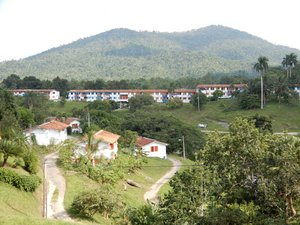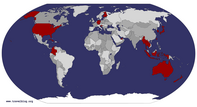Advertisement
Published: October 19th 2017

 Communa Terraza
Communa Terraza
The commune is set in the mountains with a lake nearby. It was a very pretty setting.While the state is the dominant player in the Cuban economy, many people work in other jobs on the side or set up their own enterprises. These people are referred to as “workers on their own account”, as they may not have the normal benefits associated with state jobs. With doctors earning as little as $50 per month in the official state sanctioned economy, I can understand why people may want to become workers on their own account, especially with tourism booming (it is now the most important industry). On our trip to Vinales and all around Vinales, we saw that this side of the economy is alive and well.
We headed west on the main highway after our morning tour of Havana. We had two stops en route to Vinales. The first was lunch at a family run place near the 16km marker on the highway. It was a cute little restaurant in the middle of nowhere with a great view of the surrounding hills. It was full of locals... on a Monday afternoon. The food was good. The meal included fried fish and a really good crabmeat in a tomato-based sauce. The bathrooms here weren’t fully functional. There

 Communa Terraza
Communa Terraza
Children playing in what I assume is meant to be the town square fountain. There wasn’t any water in that fountain.was a woman stationed outside the toilet whose job was to pour a bucket of water into the commode after each person used it. During our stay in Cuba, we encountered a number of toilets that were like that. Toilet seats also appeared to be in short supply. Travel tip: carry toilet paper with you just in case the public toilets you visit don’t have them. Sadly, toilet paper was one of two items I took out of my backpack (the other was my hiking boots) after I arrived home in Honolulu from Asia because I thought I would not need them on a package tour.
Our second stop was Communa Terraza, a commune in the mountains. According to Tony, the government encouraged rural people to settle in communes to help one another get by and be as self-sufficient as possible. The commune itself was set in a pretty forested area with a lake. Tony brought us to a ration store, where people get their rations for essential goods such as rice, cooking oil, sugar, salt, eggs, coffee, and even clothes and shoes. With respect to clothes, one nonsensical choice men have to periodically make is between handkerchiefs and

 Communa Terraza
Communa Terraza
This is the ration store. We watched as people came prepared with bags and containers (everything is reused here). The official ration for rice seemed to be 6kgs. underwear; you can choose one in any given period of time, but not both. Apparently, eggs have been in short supply since the recent hurricane as hens have been too stressed to lay eggs. He showed us a ration book, how rations are allocated based on age and family size, and how the book was used. Other less essential items, or excess allocations of essential items, have to be purchased with cash at normal stores. This was very fascinating to me, as I had never encountered rationing before. In fact, I've rarely encountered scarcity. It made me all the more aware of how privileged I have been all my life. From what I could surmise, rationing happens in Cuba partially because the state controls production and makes sure that essentials are properly distributed, and also because economic sanctions and various other economic and logistical uncertainties have caused various degrees of scarcity over the years. After visiting the ration store, we had coffee at the commune and we all bought wifi cards as they were more readily available here.
After the commune, we drove about 1.5 hours to Vinales.
We arrived in Vinales around 6pm. Our guesthouse for

 Our Guesthouse
Our Guesthouse
We had breakfast on this patio.the next two nights was owned by Sisa and her husband. We had two rooms and a patio with a dining table in the front of the compound, while the three generations living there stayed at the back. They watched telenovellas in a room between the two guest rooms. They had a very sweet but very timid rescue dog named Sophia. Sophia took an immediate shine to me. She was the only neutered animal I knowingly met on this trip.
Vinales appears to be very pretty and I am excited to check it out tomorrow. After checking in to our guesthouse, we went for dinner at a restaurant owned by Carmen, one of Vinales’ first female entrepreneurs. Meanwhile, we saw Tony being fondly greeted by everyone in the vicinity. He seems to know everyone in this town. When we got to the bus, we found a young man named Yandry on board. Yandry has down’s syndrome and he liked hip hop. He stayed on the bus as it drove off, much to the chagrin of his mother who walked up as we drove off with him. She laughingly gave a “where are you taking my son?” hand gesture as

 Vinales
Vinales
Residential street on which our guesthouse was located.we sped off.
Carmen’s restaurant was on the outer fringes of Vinales. In her kitchen, Carmen and her family showed us how plantains and rice and beans are made. Most importantly, she showed us how to mix a mojito. The meal included lobster again! After dinner, Tony gave us a salsa lesson. I’m terrible at following patterns so I practiced a little and sat out most of it.
Our half day program the next morning had us visiting two viewpoints, a tobacco farm, and a mural. The two viewpoints were from large state-owned hotels. Both the hotels were empty of guests. This was in contrast with Vinales, where it seemed as if three out of every four homes were set up as guesthouses - workers on their own accounts. The houses which doubled as guesthouses were often renovated and brightly painted, and they certainly brightened up the town. Anyway, the views from both the hotels were great. The Vinales landscape is made of limestone, and so there were cliffs and jagged rock outcrops everywhere.
After the hotels, we went to a tobacco farm, where we were shown how tobacco is processed and then turned into cigars. The

 Tobacco and Cigar Production
Tobacco and Cigar Production
Tobacco leaves being cured in the barn.farm sells most of its crop to the state, but is allowed to keep some for their own sales. Our final stop of the day was something labeled as a prehistoric mural. In reality, it was painted onto the side of a limestone cliff in 1961 and it was a colorful mural made to look like an old cave painting.
We returned to Vinales for lunch at a Mediterranean restaurant with homemade goat cheese as its speciality, and then we had the afternoon off. We all headed into the town square, where the state telecom company has a wifi hotspot, and we used the cards we purchased yesterday to access the internet and get caught up on news and social media. Each card, which we bought for CUC 1.50, buys one hour of wifi access. I learned that there isn’t much of a data network and most homes do not have internet access. Indeed, nobody seems to be walking around Cuba staring at smartphones - children were actually out and about playing and interacting with one another. The town square was full of tourists and some locals logging onto the internet. From what I understand about official salaries in

 Tobacco and Cigar Production
Tobacco and Cigar Production
Cigars being rolled from the leaves. Interestingly, even the packaging was natural - it was made from a dried leaf that was hardened enough to protect the cigars from being crushed.Cuba, I doubt many people would make it a priority to purchase these cards on a regular basis to access the internet. While we were at the town square, we came across another type of worker on their own account... let’s just call her the Town Square Lady. She sized us up, opted to ignore me and engaged Jeff in conversation, telling him about her guesthouse and various relatives who own a taxi service. She lost interest and wandered off when he pointed to me as his spouse in response to her question about whether he was married.
After our internet session, Jeff and I went on a walk around the town, and we also explored a few side lanes. We then had a lemonade at a drinks stand before heading back to our guesthouse for a short rest. That evening, we were driven to dinner at a farm nearby. In the early 1990s, food and other necessities became even more scarce in Cuba after the collapse of the Soviet Union. The Cuban economy was heavily reliant on sugar at the time, and the Soviet Union was its main market and also its main benefactor for essential goods that

 Exploring
Exploring
Jeff crossing a plank bridge during our exploratory walk while children played nearby.weren’t produced locally. With the collapse of the USSR, farmers didn’t even have fertilizer. This farm pioneered organic cultivation techniques that didn’t require fertilizer, and then taught other farmers these techniques. The farm has since grown and it now has a restaurant at which we ate that evening. The views of the valley below were spectacular as we ate and watched the sunset behind the limestone mountains.
These couple of days were an eye opener because of the insight I got into peoples’ lives in Cuba. If I had my druthers, I would have stayed at least one extra day and rented an e-bike to explore the surrounding area on my own. It is heartening to see entrepreneurship of various sorts - workers on their own accounts - alive and well. I hope that with tourism booming, more can partake. Apparently, Vinales may become the first town in Cuba to have in-home internet access because of the number of tourists visiting. I hope that becomes reality.
The US State Department’s recent advice to avoid travel to Cuba - which appears to be based on a sonic threat of unknown origin targeting specific locations - doesn’t appear to me
to be a threat that would impact the average American visitor, but, unfortunately, it sounds as if there has been a rise in cancellations. This doesn’t bode well for all the people who are trying to better themselves economically. One can only wonder who is behind this perceived hazard and what has happened behind the scenes to escalate this issue, but, ultimately, it is the workers on their own account who suffer in the end.
Advertisement
Tot: 0.052s; Tpl: 0.014s; cc: 10; qc: 27; dbt: 0.0281s; 1; m:domysql w:travelblog (10.17.0.13); sld: 1;
; mem: 1.1mb
























RENanDREW
Ren & Andrew
“workers on their own account"
Excellent blog! Really enjoying the insight into the people, culture and food. I knew they used ration books, but didn't realise how it worked. The organic farm and other quirky eateries sounds amazing, as did the mojito making session. Lucky you to be ignored by the lady of the square, or should I say lucky Jeff? ;)